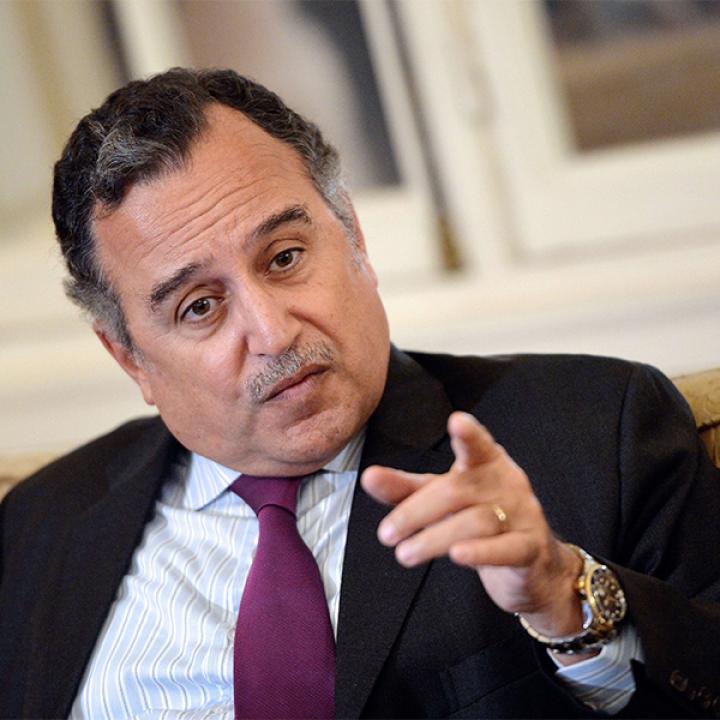

The latest official Egyptian visits to Washington need to be complemented by a high-level Egyptian military delegation that engages senior U.S. policymakers, as well as a broader attempt to improve political understanding between the two countries.
Next week, Nabil Fahmy will make his first trip to Washington as Egypt's interim foreign minister. His visit comes on the heels of a more important trip earlier this week by intelligence chief Gen. Mohamed Farid el-Tohamy -- whereas Fahmy's trip will focus on reaping public diplomacy rewards, Tohamy's had a far more technical and substantive dimension, focusing on bilateral intelligence cooperation and counterterrorism efforts. Yet the foundation of the U.S.-Egyptian relationship has always been the military partnership. Next week, a senior U.S. military delegation will visit Cairo, and Egypt should respond in kind, dispatching a high-level military delegation of its own to engage key civilian U.S. policymakers.
The latest bilateral visits are a positive step toward narrowing the mistrust that has persisted between the two capitals and jeopardized decades of U.S. investments in strong relations with Egypt. Since July 2013, when the Muslim Brotherhood-led government was ousted, the main source of tension has been the Obama administration's insistence on a political order that includes reconciliation with the Brotherhood, and some U.S. officials remain concerned about the group's future today. While Tohamy is well known as a hardliner when it comes to the Brotherhood, Fahmy told the Washington Post in November "that the reformed political process must include the Muslim Brotherhood's Freedom and Justice Party if it is to have legitimacy." It remains to be seen what his message will be during his trip to Washington. Even if he does not offer a new olive branch to the Brotherhood, many U.S. policymakers will want credible assurances that Cairo will relax its tough stance against other, peaceful opposition elements, along with journalists and NGOs.
As for Tohamy's visit, initial indicators suggest that it was effective, spurring the Obama administration to authorize the previously delayed delivery of ten Apache attack helicopters in support of counterterrorism operations in the Sinai. Yet the mood in Washington is still one of reluctance to fully support Egypt's political trajectory since last July.
The success of Fahmy's trip will depend on his ability to capitalize not only on Tohamy's visit, but also on strong Saudi and Emirati efforts to change Washington's negative perceptions. Of course, this will be a difficult task, and Fahmy's meetings with Secretary of State John Kerry and the White House will be of considerable importance. One of Fahmy's formidable tasks will be to offer quiet reassurances that Cairo will not view newly reinvigorated counterterrorism cooperation as a license for continued indiscriminate crackdowns against nonviolent critics.
The White House's view of Egypt's trajectory is also the reason why Tohamy and Fahmy's visits came so late -- a full nine months after they assumed their posts. In contrast, Fahmy and Field Marshal Abdul Fattah al-Sisi visited Moscow in February as part of an ongoing rapprochement between the two countries. Russia also helped launch Egypt's first satellite into orbit earlier this month, and it is now finalizing a major $3 billion arms deal with Cairo that will include around twenty advanced MiG-35 combat aircraft. Washington's inconsistent policy made Cairo open to offers of weapons sales from other countries, and Moscow was quick to seize the opportunity for commercial and geostrategic reasons.
These Russian advances illustrate how much the U.S.-Egyptian relationship has deteriorated during the intense contest of narratives between Cairo and Washington. Last October, the Obama administration took the unprecedented step of holding up some military assistance to Egypt in order to signal its displeasure, but this attempt to influence events on the ground has been futile thus far. As a result, some policymakers have come to regard the White House's policy as contradictory or shortsighted, with harmful regional implications.
If the Obama administration resumes its heavy-handed public effort to shape unfolding political events in Cairo at the expense of the strong U.S.-Egyptian military partnership, it will have dire implications for the future of bilateral relations. Egypt's upcoming presidential election -- in which Sisi is expected to win a genuine victory over a credible non-Islamist opponent -- offers another opportunity to address the lingering difficult questions that have hampered relations. In the meantime, a senior Egyptian military visit to Washington could help set the stage for the future. As in the past, the decades-long military partnership should provide the foundation for both governments to adopt a more measured, realistic approach to ongoing political developments.
Adel El-Adawy is a Next Generation Fellow at The Washington Institute.



